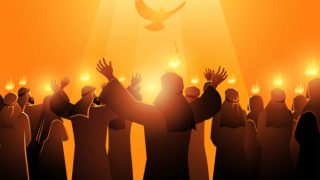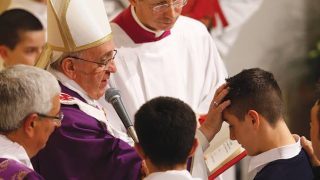
DID THE FATHER ANSWER THE PRAYER OF CHRIST FOR UNITY?
HOMILY FOR THE SEVENTH SUNDAY OF EASTER, YEAR C (WORLD COMMUNICATIONS SUNDAY). Readings: Acts 7:55-60; Psalm 97; Revelation 22:12-14.16-17.20; John 17:20-26.
Traditionally, after the Solemnity of Ascension of the Lord, we celebrate World Communications Sunday as Christ communicates with his Father in a prayer that centers on unity – John 17 (that they may be one as you and I are one). Reflecting on Christ’s prayer for unity, and with the existing conflicts and divisions among us, can we say the prayer of Christ is not answered by his Father or was partly answered? My lips quiver when I reflect on this theme as I ask myself: how can I preach unity in a nation where the factors dividing us are becoming much more than what binds us together?
Can two walk together without agreement? No! Was there an agreement before some ethnic groups came together as a nation called Nigeria? Or was it imposed on us for economic reasons by the Brits through Lord Fredrick Lugard in 1914 without considerations of compatibility of the Southerners, Easterners, Northerners, and Westerners, nor consideration of the various tribes? No consideration of the thought and feelings of ‘the would be Nigerians.’ Some persons refer to this situation as unholy matrimony of unfortunate couples that were not informed and were forced to get married. In the context of the Catholic Church, any matrimony of this nature is invalid. What about a social, geographical and political context like Nigeria? The result is evident in tribal marginalization among us. We may be a federal state on paper but a tribal state in reality. The propaganda of unity in diversity seems not to make headway as we lack mutual trust and live in fear of the other tribes or religions in this country.
The first reading today presents to us the death of Stephen the first martyr. When Stephen declared that he saw Jesus in a vision standing at the right hand of God, it was too much for the Sanhedrin to bear and they violently reacted against him, “They cried out with a loud voice and stopped their ears and rushed together upon him. Then they cast him out of the city and stoned him…” (Acts 7:57). For Stephen to suggest that the crucified Jesus stood in a position of authority at the right hand of God must have ranked as blasphemy in the thinking of those who knew that a crucified man died under the divine curse. Casting him out shows the extent of their rage or anger by executing him, which was done without regard for the Roman law, and was performed according to the traditional Jewish custom.
As we contemplate the execution of Stephen by stoning, we also recall of recent in Nigeria, the death of Deborah Samuel a Christian from Sokoto State, who was stoned to death in broad daylight by Islamist fundamentalists. As if that was not enough, her body was subsequently burnt by her murderers who accused her of blasphemy without any trial. If this is the case among many others, how can we coexist as a country with diverse religious beliefs and cultures? How can there be unity when we have preconceived and misconstrued ideas about others? If staying together for over a hundred years as a nation is not working for us, should we just pathways and continue as divided nations? What is the way forward? My lips quiver! There are so many dividing factors among us, but today’s liturgy calls us to reflect, not on the factors that divide us, but on the factors that unite us.
While Stephen, full of the Holy Spirit, gazed into heaven and saw the glory of God, Christ in the gospel, lifting up his eyes to heaven, prayed for his disciples. He said, “I do not pray for these only, but also for those who will believe in me through their word, that they may all be one even as we are one. That they may become perfectly one” (John 17:21-23). This prayer, prayed by Jesus just prior to his death is often called the High Priestly Prayer, because he intercedes with God on behalf of the disciples, present and future. This prayer is Jesus’ Last Will and Testament as it represents his provision for his disciple’s needs on the eve of his death. It is also a prayer for the unity of believers as Satan works to divide us while Christ works to unite us. This prayer is not for those who do not believe in him, but for those who believe and those that will come to believe in him. If this is the case, under what platform do we strive for unity when our beliefs are different?
Does the prayer of Christ on unity entail diverse religious beliefs or geopolitical zones? If so, why is there so much disunity among us as a nation and as Christians? Is it the case that the prayer of Christ was not answered? We may not categorically say yes or no. When Christ prayed, “that they may be perfectly one,” such is possible only by the grace of God. We recall among the disciples their possible moments of division when they argued about who was the greatest (Mark 9:34). James and John requested, “Grant to us that we may sit, one at your right and the other at your left, in your glory” (Mark 10:37). The early church also experienced doctrinal controversies such as circumcision and other conflicts (Acts 15). However, the grace of God through the Holy Spirit enabled them to work together in proclaiming the gospel of Christ. This grace brought unity that makes their proclamation highly successful. If on this aspect the prayer is answered, on the other hand, is the futuristic aspect of the prayer, as Christ widens the circle of those who will follow and believe in him through his disciples.
In a nutshell, if our points of divergence are enormous and continue to lead to the loss of life and property as a result of religious background under the umbrella of a nation that cannot protect its citizens, it is advisable we separate. If not, let us shield our swords, and uphold our points of convergence with the true practice of federalism. In a pragmatic way, the Church communicates to us to give unity a chance by getting our Permanent Voters Card (PVC), hoping that someday, the Northerners, Southerners, Easterners, and Westerners will eat from the same plate in peace and unity.
Happy Sunday!
Fr. Ken Dogbo, OSJ










